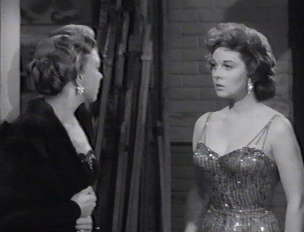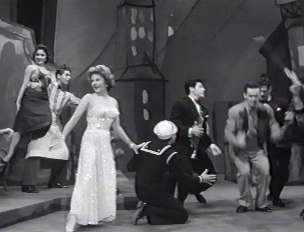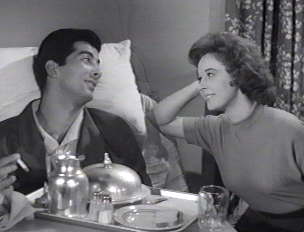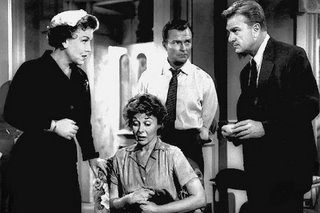 I'll Cry Tomorrow (1955)
I'll Cry Tomorrow (1955)
Director: Daniel Mann
Lillian Roth was a professional entertainer who entered show business in 1916, at the age of five, appeared on stage billed as "Broadway's Youngest Star" and in silent films during the 1910s and 20s, and became popular for her bluesy singing voice and presence in talkies and on the stage during the 1930s. By 1934, Roth had become a raging alcoholic, and her career took a precipitous dive. She staged a comeback in the late 40s and 50s after she attained sobriety through Alcoholics Anonymous and published an autobiography in 1954 called I'll Cry Tomorrow. The popular book was quickly optioned by MGM and made into a film of the same name that earned Susan Hayward her fourth Academy Award nomination for her harrowing performance as Roth.
In many ways, I'll Cry Tomorrow was the most typical film of its time. The so-called women's films made by directors such as Mitchell Leisen, Douglas Sirk, Vincent Minnelli, and George Cukor, to which I'll Cry Tomorrow belongs, are solid melodramas that center on the life and loves of a woman. Some of these films can be sudsy, but more often they tend to deal with their heroine's dilemmas in a fairly straightforward way, giving women in the audience a fantasy that they can still identify with.
Another popular element in films of this time was Freudianism and other psychological theories. I'll Cry Tomorrow provides psychological reasons aplenty for Roth's descent into a bottle and abusive relationships, and extols the virtues of self-help remedies and support groups. In many ways, this film pioneered an approach so many modern women's films--and the general population--have adopted. And it certainly provided a successful template for the 1962 biopic Gypsy, starring Natalie Wood.
So what does this film have to offer that is peculiarly its own? I'll Cry Tomorrow has a feeling of truth about it, an attention to detail, even as it ranges over a very wide time span and life experience, that keeps it rooted in the central dilemma of its main character. It is suggested in a couple of very painfully rendered scenes that Roth's problems stemmed from a stage mother who refused to let Lillian plan her own life and filled her with feelings of worthlessness. The scenes between the young Lillian (Carole Anne Campbell) and mother Katie (Jo Van Fleet) are filled with desperation and longing. I felt genuinely touched when a neighbor boy named David (David Kasday) gets Lillian involved in a water fight, allowing her to behave like a child for a brief time. Of course, this brief respite is shattered when the two children skip up to Lillian's apartment to be greeted by an ecstatic Katie saying that Lillian has received a stage booking and will be leaving town in a couple of days.
 Lillian does go on to fame and fortune. We catch up with Katie and the grown-up Lillian in Hollywood, where she is breaking into pictures under contract to Paramount. Her peformance of "Sing You Sinners" in Honey garners attention in Hollywood. She seems poised for a career build-up by Paramount. One day, she encounters a handsome man in a doctor's office who turns out to be her childhood friend David (Ray Danton). He has been trying to reach her for days, but her mother never passed on his messages. Lillian and David begin a romance that results in a confrontation with Katie. Lillian wishes to leave show business for a private life as David's wife. David provides the courage Lillian needs to try to have her own life, and Katie is visibly shaken and disappointed.
Lillian does go on to fame and fortune. We catch up with Katie and the grown-up Lillian in Hollywood, where she is breaking into pictures under contract to Paramount. Her peformance of "Sing You Sinners" in Honey garners attention in Hollywood. She seems poised for a career build-up by Paramount. One day, she encounters a handsome man in a doctor's office who turns out to be her childhood friend David (Ray Danton). He has been trying to reach her for days, but her mother never passed on his messages. Lillian and David begin a romance that results in a confrontation with Katie. Lillian wishes to leave show business for a private life as David's wife. David provides the courage Lillian needs to try to have her own life, and Katie is visibly shaken and disappointed.
 Alas, happiness is not to be. David was at the doctor's office for a serious reason he never disclosed to Lillian. He ends up in the hospital, growing weaker and weaker. A call comes to the theatre where Lillian is performing that David has died. Lillian sinks into a deep depression. Her mother hires a nurse companion for her (Virginia Gregg) who makes the fateful decision to give Lillian some scotch (you can practically hear a warning buzz of violin strings) to help her get some sleep. Lillian begins to use alcohol as a sedative every night. Soon it invades her entire life, creating problems for her performances on stage (she has to hold onto a chair at one point so she won't stumble around the stage or collapse) and eventually sending her penniless to Skid Row after she escapes the abusive clutches of her second husband Tony (Richard Conte, in a chilling performance).
Alas, happiness is not to be. David was at the doctor's office for a serious reason he never disclosed to Lillian. He ends up in the hospital, growing weaker and weaker. A call comes to the theatre where Lillian is performing that David has died. Lillian sinks into a deep depression. Her mother hires a nurse companion for her (Virginia Gregg) who makes the fateful decision to give Lillian some scotch (you can practically hear a warning buzz of violin strings) to help her get some sleep. Lillian begins to use alcohol as a sedative every night. Soon it invades her entire life, creating problems for her performances on stage (she has to hold onto a chair at one point so she won't stumble around the stage or collapse) and eventually sending her penniless to Skid Row after she escapes the abusive clutches of her second husband Tony (Richard Conte, in a chilling performance).
The film has minimal voiceover narration by Hayward, mainly to let us know Lillian's state of mind. She tells us that a feeling of calm and confidence came over her when she first began to drink, providing us with a psychology for her continued drinking--an escape from her feelings of worthlessness. In fact, the real Lillian Roth's father was an alcoholic. Certainly the effects of living with an alcoholic parent and an anxious mother who used Lillian (and her sister, omitted from the movie) to provide the family with a livelihood must have taken its toll. It is very likely, however, that a genetic predisposition was the main culprit behind her severe alcoholism. But such ideas were unknown in 1955 and could not be a part of this movie of inspiration.
 Lillian attempts to throw herself out of a window one day, but can't finish the task. She ends up at an AA meeting, where the man she will later marry, Burt McGuire (Eddie Albert), becomes her sponsor. The film ends with Lillian making an appearance on the TV tribute show, "This Is Your Life," where she becomes one of the first celebrities to go public with her story of addiction and recovery through AA. Again, Roth was a trendsetter for future generations of addicted celebrities.
Lillian attempts to throw herself out of a window one day, but can't finish the task. She ends up at an AA meeting, where the man she will later marry, Burt McGuire (Eddie Albert), becomes her sponsor. The film ends with Lillian making an appearance on the TV tribute show, "This Is Your Life," where she becomes one of the first celebrities to go public with her story of addiction and recovery through AA. Again, Roth was a trendsetter for future generations of addicted celebrities.
Susan Hayward's performance is intense. While her fear of her mother in the early sequences doesn't really come across, she lets all of her hatred loose late in Lillian's addictive cycle, accusing her mother of living off her and ruining her chances for happiness. One feels sorry for Katie for taking the blame for all of Lillian's problems--also a common psychological theory of the time that this movie does not debunk but suggests is overstated. I was absolutely blown away by Hayward's singing style, which compares favorably with Sophie Tucker--correct for the period during which Roth was at her most popular and very, very good. The film does not pay much attention to period detail at first, but moves into its contemporary time frame coherently. The main focus is Lillian's alcoholism, which shortchanges her years as a performer a bit, but overall, I think an acceptable balance was reached.
I'll Cry Tomorrow has been called an unsubtle sudser by some, but I can't agree. I have a great fondness for the early women's films that are stylized in a way that speaks to women. This film is among the best of the bunch. l


0 Comments:
Post a Comment
<< Home